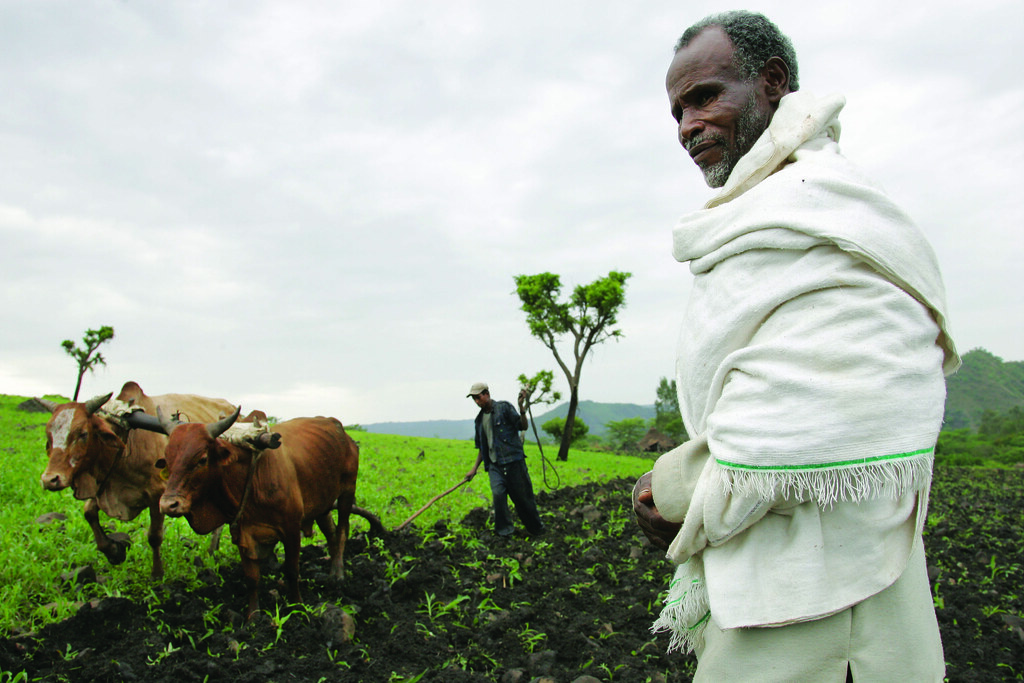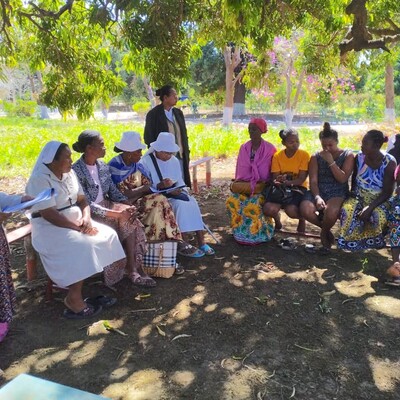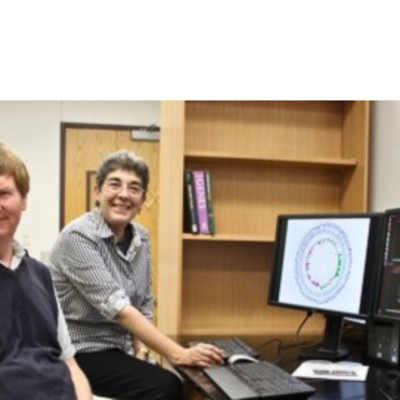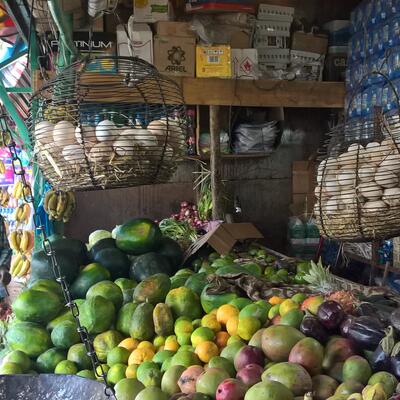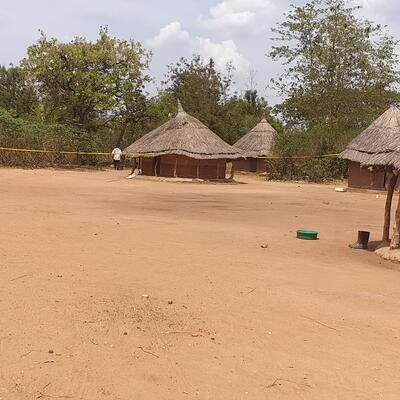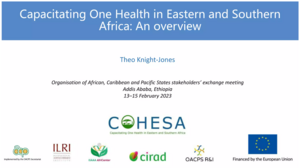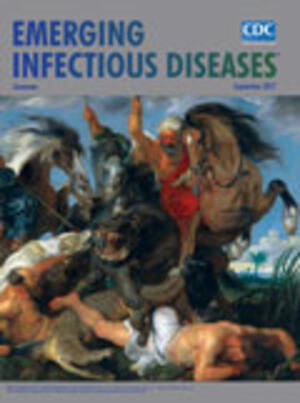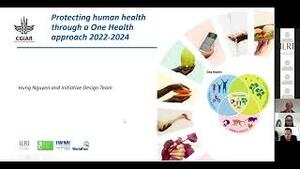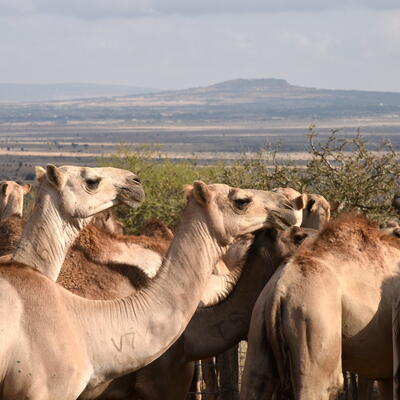
DFID/UKAid provides £4 million for genetics and health research to aid sustainable livestock production in Africa
More oxen for ploughing means less labour for farmers (photo: ILRI/Stevie Mann). In Ethiopia’s Ghibe Valley, ILRI-led tsetse fly control methods allowed cattle to flourish in an area previously almost uninhabitable for them. This encouraged more farming in the area, relieving to a degree population and soil erosion pressures in higher, tsetse-free, elevations. Such was the impact this has had on the livelihood of farmer Worku Mengiste that he was able to employ two casual labourers to do work he previously did himself. Here he watches on as they plough his field.
Research to improve the health and productivity of farmed animals in tropical climates has received a £4 million boost from the UK Government.
The investment from the Department for International Development (DFID) was announced by the Secretary of State for International Development, Penny Mordaunt, during a visit to the University of Edinburgh.
Funding will enable scientists in Scotland, Africa, Australia and the USA to tackle challenges faced by livestock farmers in sub-Saharan Africa.
It will support research in the Centre for Tropical Livestock Genetics and Health—a joint venture between the University of Edinburgh’s Roslin Institute, Scotland’s Rural College (SRUC) and the International Livestock Research Institute (ILRI), the latter of which has major research facilities in Kenya and Ethiopia.
This latest investment builds on a £10m award from the Bill & Melinda Gates Foundation announced in 2015, supported by matched funding from the three partners.
Research at the centre aims to improve the productivity of livestock breeds that are available to small-holder farmers in Africa and enhance the animals’ resilience and resistance to disease.
The centre involves UK, Africa, Australia and USA-based scientists working together primarily at two major hubs, in Edinburgh and in Nairobi. It has five research strands focusing on dairy genomics, chicken genomics, the genetics of health, new breeding technologies and data management.

Appolinaire Djikeng, a genomics scientist from Cameroon, formerly led the Biosciences eastern and central Africa-ILRI Hub (2013–2016) on ILRI’s campus in Nairobi, Kenya. Before that, Djikeng served as technology manager of the BecA-ILRI Hub, and before that he conducted research at Yale University School of Medicine and the J Craig Venter Institute. Djikeng now directs CTLGH, in Edinburgh (photo credit: CTLGH).
Professor Appolinaire Djikeng, director of the Centre for Tropical Livestock Genetics and Health, said:
‘The additional support from DFID is truly appreciated and is indeed a welcome addition to CTLGH resources, which will greatly increase our ability to support ongoing work and to attract other outstanding and highly committed scientists to tackle challenges of tropical animal agriculture and sustainable development.’
Professor Eleanor Riley, director of the Roslin Institute at the University of Edinburgh, said:
‘Livestock farming offers a route out of poverty in many parts of the world. It can also help to provide protein nutrition for children, which is key for child development and lifelong health. This welcome investment from the UK Government will build on the long-term engagement of the University of Edinburgh with partners in Africa and adds considerable momentum to the new centre.’
Nearly 900 million poor people rely on livestock for their livelihoods and the loss of animals through disease devastates people’s lives.
Professor Wayne Powell, principal and chief executive of SRUC, said:
‘SRUC is delighted to be a founding partner of this important centre. It reflects our ethos of strong translational, challenge-led research. The added value of this partnership will result in a more efficient and climate resilient improvement programme for sub-Saharan Africa.’
ILRI works to improve food security and reduce poverty in developing countries through research for better and more sustainable use of livestock. ILRI is a member of CGIAR, a global partnership of 15 centres working with additional partners for a food-secure future.
Dr Jimmy Smith, director general of ILRI, said:
‘CTLGH brings together an innovative mix of livestock genetics and health expertise working on the front lines of science-for-development impact. This important investment from the UK Government will strengthen links between UK and African researchers for the benefit of millions of people as well as sustainable livestock development.’
Read this news release on the SRUC website: £4m for research to aid sustainable livestock production in Africa, 26 Jan 2018.
Read a news clipping: Bill Gates pumps millions into quest for a supercow, The Times, 26 Jan 2018.
Related links
Global Academy for Agriculture and Food Security
Centre for Tropical Livestock Genetics and Health
Supporting Evidence Based Interventions
The Roslin Institute
The Royal (Dick) School of Veterinary Studies
Notes to editors
The announcement was made during a visit to the University of Edinburgh on Friday 26 Jan 2018 and broadcast live on Facebook from 2.30pm. https://www.facebook.com/UniversityOfEdinburgh/
For further information, please contact:
In the UK:
Jen Middleton, University of Edinburgh Press and PR Office, tel +44 (0) 131 650 6514, email jen.middleton@ed.ac.uk
Tom Maxwell, senior communications officer, Scotand’s Rural College (SRUC), tel +44 (0) 131 535 4196 email tom.maxwell@sruc.ac.uk
In Kenya:
Susan MacMillan, head of communications, awareness and advocacy, ILRI, tel +254 725 473 248 email: s.macmillan@cgiar.org






